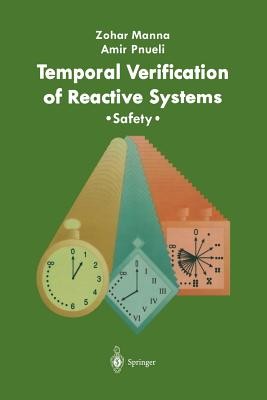
- We will send in 10–14 business days.
- Author: Zohar Manna
- Publisher: Springer
- Year: 2012
- Pages: 512
- ISBN-10: 1461287014
- ISBN-13: 9781461287018
- Format: 15.6 x 23.4 x 2.7 cm, minkšti viršeliai
- Language: English
- SAVE -10% with code: EXTRA
Reviews
Description
This book is about the verification of reactive systems. A reactive system is a system that maintains an ongoing interaction with its environment, as opposed to computing some final value on termination. The family of reactive systems includes many classes of programs whose correct and reliable construction is con- sidered to be particularly challenging, including concurrent programs, embedded and process control programs, and operating systems. Typical examples of such systems are an air traffic control system, programs controlling mechanical devices such as a train, or perpetually ongoing processes such as a nuclear reactor. With the expanding use of computers in safety-critical areas, where failure is potentially disastrous, correctness is crucial. This has led to the introduction of formal verification techniques, which give both users and designers of software and hardware systems greater confidence that the systems they build meet the desired specifications. Framework The approach promoted in this book is based on the use of temporal logic for specifying properties of reactive systems, and develops an extensive verification methodology for proving that a system meets its temporal specification. Reactive programs must be specified in terms of their ongoing behavior, and temporal logic provides an expressive and natural language for specifying this behavior. Our framework for specifying and verifying temporal properties of reactive systems is based on the following four components: 1. A computational model to describe the behavior of reactive systems. The model adopted in this book is that of a Fair Transition System (FTS).
EXTRA 10 % discount with code: EXTRA
The promotion ends in 21d.22:39:55
The discount code is valid when purchasing from 10 €. Discounts do not stack.
- Author: Zohar Manna
- Publisher: Springer
- Year: 2012
- Pages: 512
- ISBN-10: 1461287014
- ISBN-13: 9781461287018
- Format: 15.6 x 23.4 x 2.7 cm, minkšti viršeliai
- Language: English English
This book is about the verification of reactive systems. A reactive system is a system that maintains an ongoing interaction with its environment, as opposed to computing some final value on termination. The family of reactive systems includes many classes of programs whose correct and reliable construction is con- sidered to be particularly challenging, including concurrent programs, embedded and process control programs, and operating systems. Typical examples of such systems are an air traffic control system, programs controlling mechanical devices such as a train, or perpetually ongoing processes such as a nuclear reactor. With the expanding use of computers in safety-critical areas, where failure is potentially disastrous, correctness is crucial. This has led to the introduction of formal verification techniques, which give both users and designers of software and hardware systems greater confidence that the systems they build meet the desired specifications. Framework The approach promoted in this book is based on the use of temporal logic for specifying properties of reactive systems, and develops an extensive verification methodology for proving that a system meets its temporal specification. Reactive programs must be specified in terms of their ongoing behavior, and temporal logic provides an expressive and natural language for specifying this behavior. Our framework for specifying and verifying temporal properties of reactive systems is based on the following four components: 1. A computational model to describe the behavior of reactive systems. The model adopted in this book is that of a Fair Transition System (FTS).


Reviews